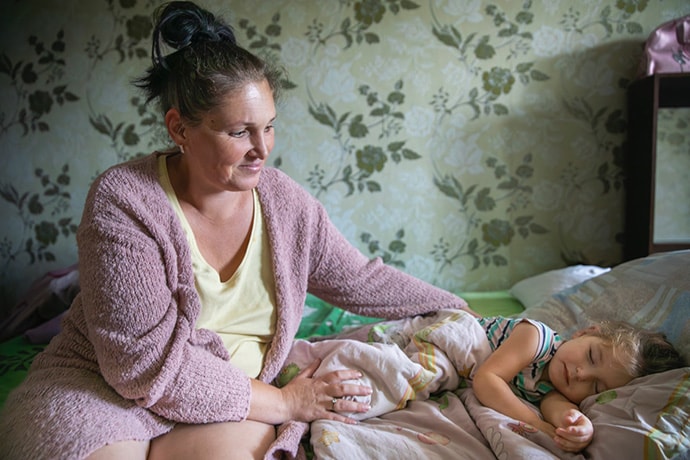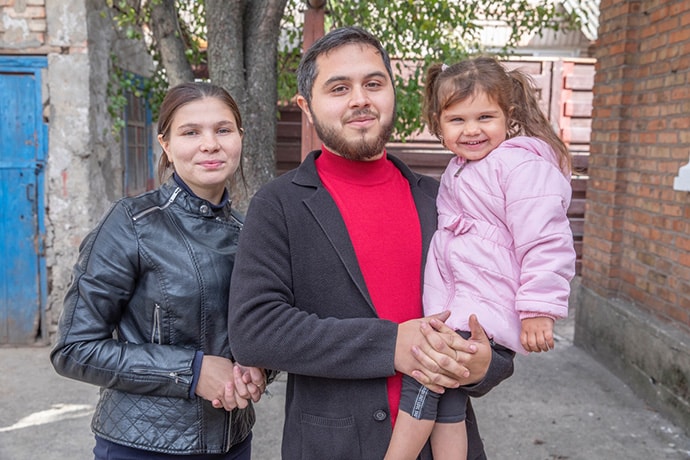By Ray Mwareya

September 2023 – Tetiana wakes her daughter Eva, 2, from a nap. They stayed in their hometown near the frontline through the difficult first year of the war, constant shelling, Russian control of their village, and a flood. Only recently they relocated to a safer location. Mercy Corps provided them with cash assistance, which they were able to use to pay for an apartment.
Mercy Corps has been providing international humanitarian aid for over 40 years, much of it in the form of emergency and disaster relief. Of their nearly 6,000 employees, 95% come from within the countries where they work, which is crucial for providing the right aid to the right populations at the right time. Their primary programs help build resiliency by connecting people across the globe to clean water, nutritious food, better economic opportunities, and more peaceful tomorrows—all critical to unlocking the power of human potential and strengthening communities to better cope during crises, adapt to evolving challenges, and thrive into the future.
For this Organization Spotlight, we were fortunate to have caught up with one of their program leaders working in Ukraine – not a natural disaster, yet a humanitarian disaster caused by human conflict where many of the same emergency response principles still apply.
**********
Mercy Corps – with the support of Trisha Bury, a Strategic Response Manager – is helping Ukrainians feed, clothe, and earn for themselves rather than being passive recipients of aid.
Trisha’s passion personifies Mercy Corps’ global vision “to create a future of possibility, where everyone can prosper.” Hailing from Port Angeles, Washington, she studied international relations and international development in college and grad school.
“I wanted an international career that would challenge me and eventually I ended up in humanitarian aid which I’ve now been doing for over a decade,” she says.
Her work mainly revolves around providing support to Mercy Corps teams around the world; essentially, starting up new programs, plugging in for temporary vacant leadership gaps, or guiding country teams in times of high-impact change. “I deployed to support our teams in Haiti, Central African Republic, Democratic Republic of Congo, Mali, Niger, and Burkina Faso. And now Ukraine,” she adds.
Mercy Corps has a solid humanitarian legacy. It has worked globally in some of the world’s most volatile places for over 40 years – channeling disaster management and recovery work. “We are currently present in about 40 countries. We have over 6,000 staff globally,” she reveals.
From Ukraine to Gaza to Sudan, fresh humanitarian disasters are rolling out every year. It must be hard for Mercy Corps to quickly prioritize who needs help, how much, and for how long.
“Yeah, there really is,” she says of the competing, demanding situations.
One way of making that choice is to work where Mercy Corps can have the biggest impact, leveraging its global and local expertise, and the resources that are available in terms of both funding and human resources.
“Globally, we’re specialized in food security, water security, economic opportunity, and peace and good governance, and humanitarian aid is sort of a cross-cutting area of work that we do,” she says.
Ukraine is among the most challenging humanitarian regions of recent times. As per UN figures – Russia’s invasion has killed 10,000 civilians to date and damaged $138 billion in hard infrastructure as of January 2023.
Between water, food, and medical support for vulnerable Ukrainians, it’s tricky to know what gets priority.
“Needs differ widely across the country. We have people in the east and the south of the country close to the front lines who are affected directly by the conflict. So often we have people whose homes are damaged by shelling; maybe water and electricity services might be cut off. Medical services might also be compromised. Here in Kyiv or over in the west, you have a lot more people who are displaced from those areas; they may have problems re-establishing their livelihoods. Finding houses to rent for the medium- or long-term, until the situation stabilizes in their home region, is key,” she says.
Even different people in the same place can have different needs based on their circumstances, and Mercy Corps’ local partners offer tailored support for marginalized groups : the Roma community or members of the LGBTQI community.
Globally, one of Mercy Corps’ priorities is that our response is increasingly, locally led. “95% of our team members globally are from the countries we work in,” she says, including in Ukraine. It also means partnering with more local organizations that have longer-term experience on the ground. They tend to know the situation the best, what the needs are, and what types of assistance are the most effective.
“We also always coordinate our activities with local and national government authorities and with other actors who are working in the same areas to make sure that we’re giving the right kind of assistance, and that we’re not duplicating assistance from other agencies.”
From big global organizations like the UN or Oxfam, giving people cash directly has proved to be a win-win policy for both civilians and local market traders. This is an approach Mercy Corps likes a lot.
“For about the past decade, one of the things Mercy Corps does is to program more and more through cash, so that it’s something flexible. The people in need can decide for themselves what are the most urgent needs and how they can use cash to meet those needs,” she says.

October 2023 – Yurii, owner of a grain processing factory in a small village in the north of Ukraine, standing in the doorway of his factory building that was severely damaged during the first months of the war. With the grant received from Mercy Corps, Yurii was able to purchase materials needed to rebuild the fire-damaged building, as well as purchase equipment to begin processing grain once again.
Is Mercy Corps covering every part of the country, or is it keeping itself to the so-called safe zones in Ukraine?
“It’s also important to remember there are not any safe zones in Ukraine because even capital cities are being hit with missile attacks,” Trisha says.
Mercy Corps is “sort of everywhere” in Ukraine wherever the neediest people are, she says. Where markets are working, Mercy Corps provides cash. Where markets are not working or where people are not able to leave their homes to access markets they provide in-kind support. Items like food, hygiene supplies, and materials to repair shelters are standard.
Because in Ukraine some populations may be living in intense conflict zones whilst others have a breather from periods of conflict, aid disbursements vary depending on the security situation.
However, the key is to build resilience. “So, we help people re-establish farms or re-establish other types of livelihoods that may have either been disrupted or displaced by the conflict,” she says.

September 2023 – Volodymyr with his daughter, Sasha, 7, in front of his furniture workshop. A husband and father of two, he owned a successful furniture business in his hometown in the Donetsk region. When the danger was too great, the family moved to Dnipro, where Volodymyr had to start his business from scratch. With the help of Mercy Corps’ grant, Volodymyr and his team were able to purchase equipment needed to provide quick, high quality work that helps them to establish their presence as a small business.
Now to the big issue lingering in readers’ minds. The security situation across Ukraine is terrifying. Transport links have been bombed out or mined and crop fields spoiled by bombs. It must be risky for Mercy Corps to get the aid in Ukraine in suitable quantities that the population needs.
“It varies quite a lot,” she says. “Sometimes, we’ll plan an activity a few days, or even weeks in advance, and then an attack happens, and we have to pivot very quickly or cancel something.”
The key is that Mercy Corps has a dedicated security team that helps develop procedures to minimize risk as much as possible.
But, she insists, “there isn’t a safe place in the country at the moment.”
Currently, many Ukrainians are displaced, sometimes out of the country or to other parts of the country. The International Organization for Migration report, as of July 2023, a staggering 5.1 million Ukrainians are internally displaced.

September 2023 – Eduard, his wife Rima, and 2-year-old daughter Lora standing in the yard of their house. They had just started their family when the war escalated. Eduard lost his job and Lora would cry during explosions. Once a bomb fell on their neighbor’s property; while no one was injured, the impact shattered the windows of their home. Mercy Corps multipurpose cash assistance, possible with support of local partner organization “Voice of Romni” helped the family purchase an oven, repair their home, and purchase enough food to store for the winter.
It must be challenging to keep track of who has received aid and to audit the impact of the aid. “Yeah, just like many countries in conflict or climate disasters,” says Trisha. Key measures include coordinating with the government and targeting areas that aren’t already being assisted by someone else.
“We also occasionally, have data-sharing agreements with these other agencies so we can compare lists of people that we’re helping to make sure there’s no overlap or duplication, and we also have an internal monitoring, evaluation and learning team,” she says.
They do in-depth surveys and in-person monitoring when possible, to check the effectiveness of their programs. “We make changes where we find we can be doing something better,” she adds.

September 2023 – Alisa, 6, picks cucumbers with her grandfather Valerii. Alisa’s mother, Maryna, is a farmer and prior to the war, she owned a successful business with more than 60 acres of crops, and two stores in the area. When the war escalated, the family had to leave nearly everything behind. When they found out Maryna’s home and the home of her parents were destroyed, Maryna, insisted that they rebuild, and make a home again. With cash assistance from Mercy Corps, Maryna and her family were able to purchase the metal needed to build a frame, wood for bracing, and an irrigation system.
Mercy Corps plans on staying in Ukraine when the war ends. They already have programs in Ukraine with a focus on the agricultural sector, which will become a priority area for rebuilding.